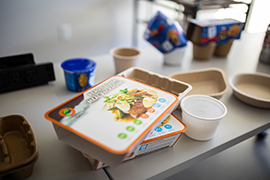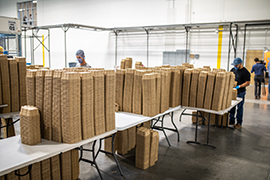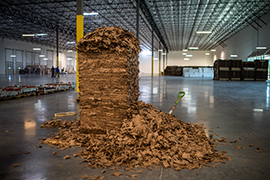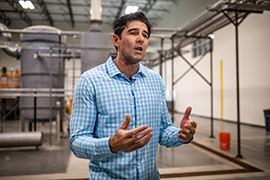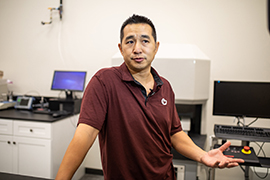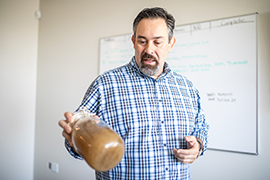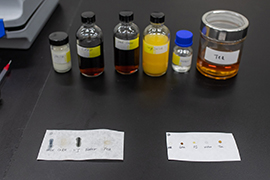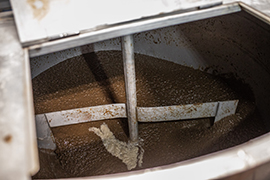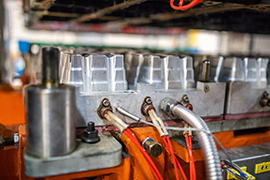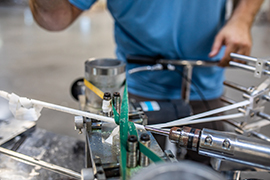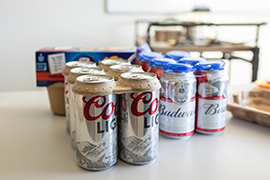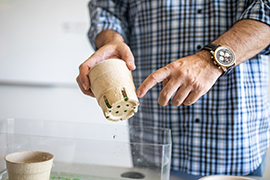- Slug:BC-CNS-Replacing Plastic, 610 words
- 12 photos, video story available (thumbnails, captions below)
By BRYCE NEWBERRY
Cronkite News
GILBERT – From meat trays to mac-and-cheese cups, single-use plastics that pack grocery-store aisles often end up in landfills. An Arizona company is on a mission to replace them with biodegradable and compostable products over the next five years.
“We had the vision that the whole world was going to demand alternatives to plastic,” said Troy Swope, founder and CEO of Footprint.
The trick is inventing a material that’s as convenient useful as plastic.
Swope, who’s passionate about overcoming obstacles through innovation, and his business partners created Footprint in 2012. The company’s leaders used to work for Intel before putting their technology and innovation skills to work to start their own company.
They now produce packaging for big companies, including Walmart, Costco, Tyson Foods and Kraft.
The company does have competitors, such as Be Green Packaging in South Carolina, but most of those companies are focused on simple solutions to single-use plastics, such as takeout containers. Footprint is working on technology to tackle more difficult plastics, like frozen-food containers and meat trays.
They do this in their manufacturing facility in Gilbert, which recently relocated to a new industrial park. Much of the manufacturing space is empty, but the company, which currently employees 650 people, plans to expand over the next several years, and add 250 staff.
Stacked up along the walls of the production floor are bales of corrugated paper – cardboard – the first step in creating biodegradable products. The paper is ground up and mixed with various solutions, depending on the product, before going through 338-degree heat machines that mold the material.
The products are made from a slurry. Different coatings are added to the mixture to create barriers against moisture, oxygen and oil, which is needed for food products to maintain shelf life while in storage.
This year, the company began producing paper straws, and it plans to increase straw production by the end of the year. It’s working to find the perfect paper and adhesive combination to make a long-lasting straw.
“The most difficult part is the customers want biodegradability and compostability, yet they still want the product to behave like plastic,” said Yoke Chung, chief technology officer of Footprint.
The science behind the products is important, and so is the company’s environmental impact. It says carbon dioxide emissions are reduced by 40 to 60 percent depending on the type of plastic the Footprint materials are replacing. The company also says energy use drops as much as 50 percent.
“If you start looking at plastic’s true cost,” Swope said, “like the cost to haul it away and store it for 100 and some years, then we’re way lower cost than plastic.”
Mick Dalrymple, director of university sustainability initiatives at Arizona State University, recently toured Footprint. The company has a big, but not impossible, goal, he said.
“It’s a matter of how fast can they scale up? How can they fend off any competitors, and then also things like how can they avoid manufacturers that want to make exclusives with them?” Dalrymple said.
In five years, Footprint has invented more than 400 items, patenting at least three dozen of those items, including containers for produce.
“We want you to walk into a grocery store today, and you see all the plastic, and in five years, you’re going to walk into that grocery store and go, we changed this whole store – the bakery, the meat trays, the yogurt containers, right, the coffee lid on the way out – we’re going to transform that grocery store and it’s going to happen fast,” Swope said.
Footprint plans to increase production in the United States and expand into Mexico and Europe over the next few years.
This story is part of Elemental: Covering Sustainability, a multimedia collaboration between Cronkite News, Arizona PBS, KJZZ, KPCC, Rocky Mountain PBS and PBS SoCal.
Subscribe to Cronkite News on YouTube.
For more stories from Cronkite News, visit cronkitenews.azpbs.org.
^__=
Samples of biodegradable molded fiber packaging designed and developed by Footprint. The Gilbert-based company wants to eliminate single-use plastics for everything from meat trays to straws. (Photo by Celisse Jones/Cronkite News)
Mushroom container prototypes made of biodegradable molded fibers are stacked and prepared for shipment to Walmart at Footprint’s facility in Gilbert. (Photo by Celisse Jones/Cronkite News)
Corrugated fiberboard is stacked before being broken down into the slurry that will be used to form biodegradable molded fiber packaging at Footprint. (Photo by Celisse Jones/Cronkite News)
Footprint co-founder and CEO Troy Swope said he started the Giblert company to create sustainable products that would eventually replace plastics. The company started making paper straws this year and is working with big companies like Walmart. (Photo by Celisse Jones/Cronkite News)
Yoke Chung, co-founder and chief technology officer of Footprint, explained the process of developing meat trays that are biodegradable and compostable. “The most difficult part is the customers want biodegradability and compostability, yet they still want the product to behave like plastic,” he said. (Photo by Celisse Jones/Cronkite News)
Jeff Bassett, Footprint’s senior vice president of marketing, with a container holding the liquid slurry of paper fibers, water and oil that is heated to 338 degress and pressed to form packaged food containers. (Photo by Celisse Jones/Cronkite News)
Footprint started making paper straws this year, but even that is not as simple as it sounds. The company has been testing different liquid products to find the right paper and adhesive material to make the straws. (Photo by Celisse Jones/Cronkite News)
Slurry, a liquid solution of paper fibers, water and oil that is heated and pressed to form packaged food containers, is mixed and diluted at Footprint’s facility in Gilbert. (Photo by Celisse Jones/Cronkite News)
Molds are used to heat and apply pressure in the final step of creating the biodegradable molded fiber packaging at Footprint. (Photo by Celisse Jones/Cronkite News)
After the adhesive glue is applied to the paper, it is formed into biodegradable straws at Footprint. The Gilbert-based company started to make paper straws this year. (Photo by Celisse Jones/Cronkite News)
“We had the vision that the whole world was going to demand alternatives to plastic,” said Troy Swope, founder and CEO of Footprint. Swope and his team want to eliminate single-use plastics like meat trays and six-pack holders. (Photo by Celisse Jones/Cronkite News)
Jeff Bassett, senior vice president of marketing at Footprint, shows a sample of biodegradable molded fiber packaging designed and developed by the company. (Photo by Celisse Jones/Cronkite News)
